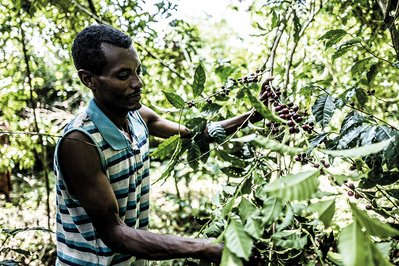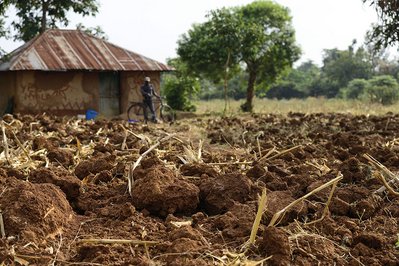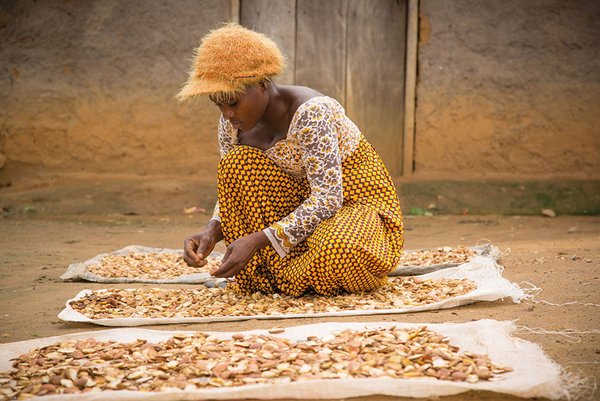 Download this article in magazine layout
Download this article in magazine layout
- Share this article
- Subscribe to our newsletter
Shaping the transformative change – development cooperation’s role
About 80 per cent of the world’s biological and genetic resources are located in the tropical and subtropical zones, mostly in developing countries. However, in those countries, biodiversity and the ecosystem services related to it are under growing pressure. This is all the more dramatic since especially in the Global South, people rely on healthy ecosystems to satisfy some of their basic needs and for their economic development. For instance, groundwater ecosystems and their (micro)organisms provide one of the most important bases of life – drinking water. Flowing waters and active floodplains maintain flood retention, and forest ecosystems help control the water cycle by regulating precipitation, evaporation and flows, as well as having an enormous impact on the local, regional and global climate as carbon sinks. Trees in tropical rainforests store half as much carbon as trees outside the tropics. In addition to bearing an important cultural and spiritual significance for local groups and indigenous peoples, natural resources are an important source of income for many people, especially in developing countries.
At the same time, developed countries benefit immensely from intact ecosystems in the Global South regarding global climate and water regulation, natural resources for countless industrially manufactured goods and basic elements for numerous pharmaceutical drugs. Thus, it is evident that a biodiversity-rich planet is the basis of life for us and the generations to come.
Recognising the fact that the overwhelming majority of the Sustainable Development Goals (SDGs) will not be reached if the current pace of biological extinction is not slowed down, the German Ministry for Economic Cooperation and Development (BMZ) supports its partner countries world-wide in three biodiversity-related fields: conservation, sustainable use and restoration of ecosystems (see also examples at the end of the article).
Protected areas are one important instrument for the conservation of ecosystems and ecosystem services, since they act as a refuge for animal and plant species while also allowing biological processes to run unimpaired. Additionally, protected areas allow the maintaining of natural distances between humans and wildlife, thus reducing the risk of pathogen spillover leading to zoonoses (infectious diseases caused by pathogens which have jumped from animals to humans). It is of high importance for protected areas to be specifically established in areas where biodiversity hotspots occur – not just in territories without (economic) benefits for humans. For instance, some protected areas exist on maps or in legislation but offer little real protection to biodiversity (“paper parks”) due to ineffective management or insufficient financing. Inclusive and human rights-based (co-)management approaches can simultaneously provide social and ecological benefits. This implies a sustainable use of natural resources aimed at balancing social, economic and cultural needs with ecosystem sustainability and resilience.
Change of land use, mostly through agriculture, is a key driver of biodiversity loss, because of overexploitation, pollution and degradation of ecosystems, among others. Transforming our agricultural and food systems could hence result in a quantum leap towards biodiversity conservation – for example with agroecology (see also article on pages 14–15). This very promising approach aims at bringing our current food systems towards sustainability and resilience. It goes beyond agricultural production, including a variety of social, political and environmental aspects that help maintain healthy agro-ecosystems while providing safe and nutritious food for all. Agroecological practices are local-specific and use, preserve and improve biological and ecological processes in agricultural production, hence reducing levels of external inputs (such as synthetic agrochemicals), and create diverse, resilient and more productive agro-ecosystems. Agroecological farming systems place a strong focus on diversification, e.g. through practices such as mixed cropping and intercropping, agroforestry, use of the locally adapted seeds and biological pest control and management, among others.
Areas where ecosystem services are already degraded require a restoration of ecosystems, which brings them closer or even back to their natural state. This refers to forests, farmlands, wetlands and oceans. Assisting them in recovering can lead to healthier, biodiversity-rich ecosystems which can better provide e.g. fertile soils and thus improve the livelihoods of people depending on them.
Moving the international dialogue forward
So far, efforts by countries and organisations have fallen short of ameliorating the looming biodiversity crisis. One reason for the current downward trend in biodiversity is a persistent lack of funds, with 85 billion US dollars spent annually world-wide, only a fraction of what is necessary. The global need for investment in biodiversity is estimated to be up to five times higher. There is a huge necessity to mobilise more public and especially private funding in all member states.
Germany is very active in moving the international dialogue forward. With more than 80 other countries, it has joined the Leader’s Pledge for Nature, committing to decisive action on nature and biodiversity to protect planetary and human health. Germany also recently became a member of the High Ambition Coalition (HAC), an intergovernmental group championing the “30 by 30” target globally. While these special-purpose organisations serve an important function in shining a spotlight on vital issues, existing forms of international coordination and cooperation should embrace the efforts for biodiversity. For example, the G7 and G20 should align their agenda with the United Nations Framework Convention on Climate Change (UNFCCC) and Agenda 2030.
In order to address the main drivers of biodiversity loss and achieve the goals of the Convention on Biological Diversity (CBD), positive turnarounds and a transformative change of society and economy are needed. As global common goods, natural resources and biodiversity require that actors at all levels assume fair responsibility. All humans depend in a systemic way on the persistence of terrestrial and marine ecosystems, and the effects of their destruction and degradation do not stop at borders. This means that biodiversity conservation needs to be mainstreamed into all policies and all sectors, including agriculture, water management, the fishing industry, mining and infrastructure. The agriculture and livestock sector, for instance, is a key leverage point for transforming our food systems. Sustainable production systems, like agroecology or traditional indigenous farming, as well as changes in our eating habits, are a prerequisite for ensuring reliable and healthy diets for a world population that will grow to more than nine billion by 2050, as is meeting the challenges of anthropogenic climate change, loss of biodiversity and ecosystem services.
What can development cooperation do?
Biodiversity in the context of transformative change can thus be seen from two perspectives. Biodiversity conservation can be the goal of a transformative change process. At the same time, biodiversity conservation and its sustainable use are means to achieve transformative change aimed at a range of other societal challenges. So far so good – but how can development cooperation support this transformation? It is essential to promote the co-creation of transformative visions and new narratives to overcome the supposed opposition between human development and biodiversity conservation. By emphasising diverse co-benefits and synergies (e.g. pandemic prevention), development cooperation can engage in dialogues and mainstreaming processes with different sectors and actors and thereby extend the action arena for transformative change.
Furthermore, development cooperation can contribute to a “transformative governance” by conducting capacity building for political actors and supporting the enabling structures needed for the implementation of an economic and societal transformation. When adopted, development cooperation can also assist partner countries in transferring the – hopefully transformative – aspirations of the new post-2020 global biodiversity framework into national policies and implementation structures. In addition, development cooperation can create good practices which stimulate new politics and strategies and prepare upscaling.
Thus, we need much more than to close the financial gap for biodiversity conservation: we need strategic alliances, a focus on synergies and co-benefits for different actors and sectors as well as innovative and courageous ideas and capacities for implementation in order to achieve a just, sustainable and green transformative change.
Sustainable resource use in Ethiopia
Ethiopia is part of two biodiversity hotspots of global importance, the Eastern Afromontane and the Horn of Africa. However, its biodiversity is under threat. The population is growing rapidly, overgrazing is increasing due to intensive pastoralism, and large-scale investments in industrial agriculture often don’t consider biodiversity and its ecosystem services. In order to preserve the country’s unique biodiversity, German development cooperation supports the relevant Ethiopian federal authorities and regional governments in successfully implementing strategies and measures for the conservation and sustainable use of protected areas and forests, thereby improving the living conditions of the local population. In the Sheka and Yakup biosphere reserves, around 30,000 people have been enabled to improve their income through the sustainable production of coffee and the integration into relevant value chains. As a result, the forests – where the coffee can originally be found – are used sustainably and are protected from deforestation.
Integrated land use planning for peatland ecosystems of Indonesia
Peatland ecosystems of Indonesia (peat and mangrove forests) are complex and interconnected ecosystems known for their high biodiversity, extremely efficient terrestrial natural carbon storage and their important role in freshwater filtration and flood protection. About two-thirds of the world's CO2 emissions from the destruction and conversion of peatland ecosystems come from Southeast Asia, primarily Indonesia. To address the devastating consequences of peatland destruction and the loss of its biodiversity, integrated land use planning and land use policies are needed at national, provincial and district levels. Therefore, German development cooperation supports the administration of North Kalimantan province in developing its planning and implementation capacities to rehabilitate peatland ecosystems in the Kayan Sembakung Delta. This should lead to improved management practices for peat ecosystems and wetlands as well as improved living conditions for the local population.
Empowering the indigenous population in Honduras
In the Mosquitia region of Honduras, the indigenous population have largely preserved their traditional way of life, thereby maintaining species-rich ecosystems that are part of the Central American Biocorridor. Despite the abundance of natural resources, poverty affects more than half of rural families living in subsistence farming due to lack of market access and increasing crop failures caused by climate change. Through Deutsche Gesellschaft für Internationale Zusammenarbeit (GIZ), the BMZ supports the clarification of responsibilities for the administration of the territories that have resulted from land titling. Building on this, it strengthens the technical and organisational skills of the indigenous territorial councils, so that they can fulfil their tasks appropriately. Gender-sensitive promotion of democratic processes is intended to increase the participation of women in political decision-making processes and their implementation. In addition, producers are supported in the production and sale of food for school meals and other markets to increase food security through income generation and increased availability of food at local level. Alternative income options for women (e.g. honey) are particularly encouraged.
Soil biodiversity for sustainable agricultural intensification
The Food and Agriculture Organization of the United Nations (FAO) defines soil biodiversity as the variation in soil life, from genes to communities, and the ecological complexes of which they are part, that is from soil micro-habitats to landscapes. In other words, soil biodiversity represents the variety of life below ground. Soil organisms including bacteria, fungi, earthworms and termites are essential for most of the ecosystem services that soils provide, namely soil formation, decomposition and nutrient cycling, carbon and nitrogen fixation and sequestration, infiltration and storage of water.
A research cooperation between GIZ’s Global Programme “Soil Protection and Rehabilitation for Food Security” and the International Center for Tropical Agriculture (CIAT) focused on agronomic management controls on microbial populations in soils and found that the application of farmyard manure (FYM) alongside reduced tillage is a good strategy to promote diversity and abundance of soil microorganisms. This recommendation subsequently supported GIZ in its efforts to out-scale sustainable ways of intensifying agriculture in Western Kenya, taking into account soil biology, microbial activity as well as associated nutrient use efficiency and crop productivity.
Anika Busch is a social scientist with a specialisation in sustainable development. She is Policy Advisor for Conservation of Biodiversity on Land, specialising in communication at Deutsche Gesellschaft für Internationale Zusammenarbeit (GIZ) in Bonn, Germany.
Contact: anika.busch@giz.de
Carolin Frisch is a geographer by training who specialises in development geography. She is Policy Advisor for Conservation of Biodiversity on Land at GIZ in Bonn.
Contact: carolin.frisch@giz.de
Justus Kröger is Junior Communication Specialist at MediaCompany in Bonn, Germany.
Contact: j.kroeger@mediacompany.com
* With contributions from Silke Spohn, Carla Amongero Noriega and Lisa Rihm (all GIZ).





Add a comment
Be the First to Comment